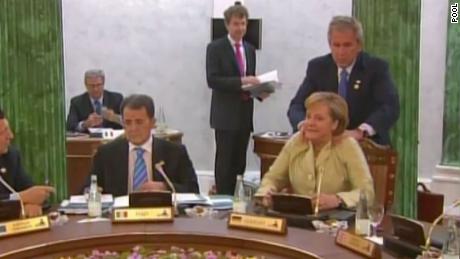This story was excerpted from the July 15 edition of CNN’s Meanwhile in America, the daily email about US politics for global readers. Click here to read past editions and subscribe.
Angela Merkel pays what is likely to be her farewell White House visit Thursday ahead of her expected retirement this fall — and will hand back the moral leadership of the West to an American President who actually believes in it.
It’s hard to remember a time when Germany’s first female chancellor — whose worldview was forged by growing up behind the Iron Curtain — wasn’t steadying the trans-Atlantic alliance. When she assumed power in November 2005, the first iPhone was more than a year from its release — and George W. Bush’s presidency was spiraling after Hurricane Katrina at home and as Iraq slumped into insurgency.
Merkel is now on her fourth US President, fourth French President and fifth British Prime Minister. She’s endured an age of extremes. After the 2008 financial crisis, she helped save the European project. She was tested by a refugee exodus from the Middle East and Russia’s annexation of Crimea. She was not amused when it emerged that the US had been tapping her phone. Brexit upset her, but she soon rallied to defend European interests. When Donald Trump — who tried to bully her and called her “stupid” — was in power, she was a stronger proponent of America’s democracy than its leader.
She’s hardly a touchy-feely politician. But President Barack Obama was a favorite. She was sniffy when the hope and change machine pitched up in Berlin for a campaign rally that drew more than 200,000 Germans. But later he awarded her the Presidential Medal of Freedom and she called him “Liebe Barack.” Over a private dinner at the Adlon Hotel, close to the route of the old Berlin Wall in November 2016, Obama pleaded with Merkel to run for another term, seeing her as the guardian of liberal values Trump meant to destroy.
It’s not all been plain sailing. The Obama team chafed at her fiscal dogma during the financial crisis. Washington still frets over her positioning on Russia and China. With Germany’s historic burden in mind, she’s refused entreaties by successive presidents to start splashing cash on defense.
But US President Joe Biden — like Merkel, one of the few Western leaders shaped by the Cold War — will miss her. Given President Emmanuel Macron’s troubles in France and Britain’s flight, Henry Kissinger’s old question will be relevant again: “Who do I call if I want to speak to Europe?”
‘Unbelievably bad’
Speaking of George W. Bush, he’s not happy.
The former President who sent US troops into Afghanistan is worried that Biden’s plans to bring them all home will allow the Taliban to inflict “unspeakable” harm on Afghan women and girls.
“I think the consequences are going to be unbelievably bad,” Bush, who has been generally loath to criticize his successors, said in an interview with Deutsche Welle.
Tens of thousands of Afghan civilians have been displaced as the Taliban, who follow a harsh brand of Sharia law, have taken control of nearly 200 districts — as US and NATO forces have been pulling back.







